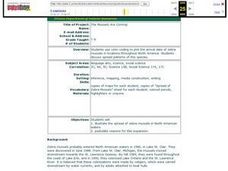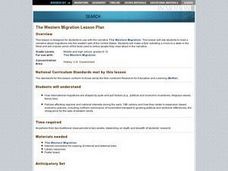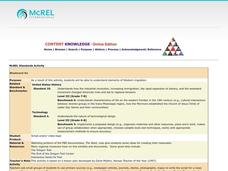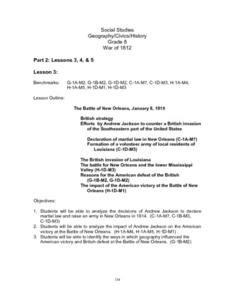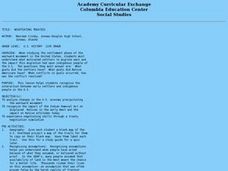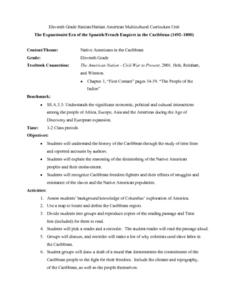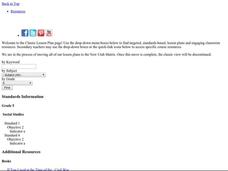Edgate
Discovering New Resources
What is a natural resource, and what resources did the Lewis and Clark expedition seek? After reading an article on the mapping of the west, learners get into small groups to discuss the important natural resources of the period. They...
Curated OER
The Mussels Are Coming
Students work together to identify and describe the various types of mussels. Using a color-coded system, they plot the arrival date of zebra mussels in North American waters. They discuss the increase in their population with the class.
Curated OER
Ute Indians: Past and Present
Fourth graders study the history of the Ute Indians. In this Ute Indians lesson, 4th graders complete a KWL chart about Ute Indians and read the online Ute Indian Fact Sheet. Students study examples of Ute culture, where the Ute Indians...
Curated OER
The Western Migration Lesson Plan
Students examine the western migration in the United States in the early 19th century and identify the factors that caused the migration as well as how government adapted to meet the needs of an expanding country.
Curated OER
Westward Ho
Middle schoolers examine primary sources regarding Western migration. In this Manifest Destiny lesson, students determine why the pioneers moved west and what the trip was like as they examine sources and write journals based on their...
Curated OER
Fort Clatsop: The Corps of Discovery's Winter at Fort Clatsop
Students investigate the Lewis and Clark expedition and how it helped to shape American expansion during its early history. Students reflect upon the period of history and its implications for America.
Curated OER
Indigenous People
Students examine what foods are indigenous to America and how Western European expansion impacted indigenous communities. They identify indigenous foods that they themselves eat, and label maps and identify ethnic groups in the Americas.
Curated OER
War of 1812
Eighth graders locate the major land forms and bodies of water on a map of Louisiana. In groups, they discuss the role of the Mississippi River in the Battle of New Orleans and how land and water affect the outcome of battles. To end...
Curated OER
The Trail of Tears; Its Grief and Loss
Fifth graders trace the development and expansion of the US while studying the Trail of Tears. They examine the political factors and analyze the impact the Indian Removal Act had upon a society. They present a case for or against the...
Curated OER
Pioneer America: Journey West
Fourth graders experience pioneer life on the Oregon trail. In this pioneer instructional activity, 4th graders research the reasons for moving west and what life was like on the trail. They create a map, complete an oral presentation,...
Curated OER
The Kansas-Nebraska Act of 1854: Popular Sovereignty and the Political Polarization over Slavery
High schoolers read selections from the Declaration of Independence, Northwest Ordinance of 1787, and the Wilmot Proviso of 1846. They contrast the maps of 1820 and 1854 to analyze developments in the national debate over slavery. They...
Curated OER
The Industrial Revolution
Eighth graders examine the time period of the Industrial revolution in American history. In this American History instructional activity, 8th graders read the chapter on this time period. Students create a presentation on this time...
Curated OER
The Kansas-Nebraska Act of 1854: Popular Sovereignty and the Political Polarization over Slavery
Why did Stephen Douglas support the Kansas-Nebraska Act of 1854? Why did Abraham Lincoln oppose it? Young historians examine how the Kansas-Nebraska Act of 1854 affected the political balance between free and slave states and explore how...
Curated OER
Negotiating Treaties
Eleventh graders recognize the interaction between early settlers and indigenous people in the U.S. They recognize the impact of the Indian Removal Act on displaced Natives in the early West and the impact on Native attitudes today.
Curated OER
Rivers to the West
Students discuss the Lewis and Clark expedition, and the reasons they may have chosen to follow certain rivers. They list the rivers that start from St. Louis and follow the route of Lewis and Clark. Students trace and label the rivers...
Curated OER
Them Damned Pictures
Middle schoolers examine and gather information from primary sources about events during the Revolutionary War. They identify and place the political cartoons. They respond to a cartoon from the point of view of someone who lived at the...
Curated OER
Headin' West! The Life of a Pioneer
Students explore the life of a pioneer and the relationship between the concept of Manifest Destiny and pioneering. Students complete activities, maps, writing and reading to experience pioneer life. Handouts and worksheets are included...
Curated OER
A House Dividing: The Growing Crisis of Sectionalism in Antebellum America
Young scholars trace the development of sectionalism in the United States. They explore slavery, freedom and the Constitution. Students identify influential opponents and defenders of American slavery. They explain different solutions...
Curated OER
Athabaskan Migration & Bering Strait
Students study Athabaskan migration patterns and the Bering Strait Land Bridge theory. They investigate the importance of the expansion of trade and compare the differences between American Indian oral tradition accounts of origin and...
Curated OER
Native People of the Caribbean
Eleventh graders use a map and locate and define the Caribbean region and then work in groups to read the passage and timeline. The groups' reader will read the passage aloud and the recorder makes a list of why colonists used slave...
Curated OER
The Lewis and Clark Expedition
Students study westward expansion. In this US history lesson, students describe the adventures and hardships faced by the explorers known as Meriwether Lewis and William Clark. Students write a report to the President about the journey...
Curated OER
An Early Threat of Secession: The Missouri Compromise of 1820 and the Nullification Crisis
Students analyze an interactive map of the Missouri Compromise to identify the regions and their relation to slavery. In this pre-civil war era instructional activity, students read primary source documents and research online to answer...
Curated OER
Clothesline Sleuth
Fifth graders investigate the effect of North American colonization on human history. In this colonization lesson, 5th graders explore the global impact of colonization of North America. Students investigate the impact of geography on...
Curated OER
The Inventions and Effects of the Industrial Revolution
Students understand that the Industrial Revolution began in England, spreading to the rest of Western Europe and the United States and with it came an increased demand for raw materials from the Americans, Asia, and Africa.



